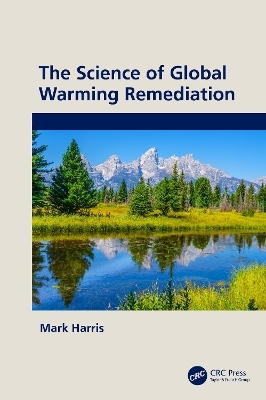
The Science of Global Warming Remediation
CRC Press (Verlag)
978-1-032-37767-4 (ISBN)
The Science of Global Warming Remediation examines the workings of a complex chemical system using concepts such as chemical kinetics, thermodynamics, and oxidation/reduction. It focuses on preventing environmental deterioration as well as using environmental chemistry for environmental cleanup or remediation. Further, it describes how to utilize mechanical, chemical, and biological methods to detoxify contaminated land or water. The book also considers how environmental legislation aims to modify human behavior so as to reduce or eliminate the environmental threats identified through science.
Features:
Presents multiple methods for water treatment
Explains the physiological dangers of exposure to various toxic materials
Illustrates the mechanisms of major partitioning systems and sinks for carbon dioxide
Examines the mechanics of global warming and the potential long-term effects
Provides step-by-step solutions to empower individuals to act locally
Mark Anglin Harris is a Professor of Applied Climatology and Environmental Chemistry at the Northern Caribbean University (NCU), Jamaica, where he has been on the faculty since 2002. His baccalaureate degree, conferred in 1977, majored in geology and physical geography at the University of Windsor, Canada. He received his PhD in environmental geoscience from the University of Adelaide in 2001, after tutoring there in 1992-1995 in earth science & physical geography. He researches mainly on remediation of polluted land, water and air. His previous books, titled "Geobiotechnological Solutions to Anthropogenic Disturbances" and "Confronting Global Climate Change: Experiments & Applications in the Tropics" were published respectively in 2016 by Springer-Nature and 2019 by CRC-Taylor & Francis. Professor Harris has been the senior author of approximately 30 research articles, having become, so far, the only multiple recipients of the NCU Distinguished Faculty Award for research or scholarship, having won it four times, in 2003, 2007, 2012 and 2016. He received the 2020-2021 Musgrave silver medal for science.
Section I. Sequestration of Carbon Dixoide. 1. The Evidence. 2. Measurements. 3. Sequestration by Forests. 4. CO2 Sequestration by Water. 5. Sequestration by Soils. 6. Carbon Footprint. 7. The Chemistry of CO2 Fixation. 8. CO2 Capture. Section II. Other Potent Greenhouse Gases. 9. Methane. 10. Nitrous Oxide. Section III. Atmospheric Emissions. 11. Sulfur Dioxide. 12. Cement, Pozzolans, and Ashes. 13. Automobile Emissions. 14. Internal Combustion Engines Operating at Suboptimum Temperatures, Climate Change, and Health. 15. Indoor Emissions. 16. Air Pollution Meteorology. 17. Thermal Pollution and Remediation. Section IV. Water. 18. Water: Pesticides and Acidity. 19. Water: Pesticides in Fish. 20. Rainwater: Collection, Pollution, and Remediation. 21. Water: Salinization. 22. Wastewater Treatment. 23. Water Protection. 24. Water: Chlorination Remediation. 25. Water: Eutrophication. Section V. Remediation of Polluted Soils. 26. Chemistry of Soil Pollution Remediation: Abstract. 27. CO2 Sequestration Using Alkali Mine Waste Treatments in Bauxite Residue Disposal Areas (BRDA). 28. CO2 Sequestration: Alkali Mine Waste Treatments in Acid Mine Drainage. 29. Pozzolanic Carbon Sequestration in Red-Mud-Treated Mortars. Section VI. Appendices. 30. Appendix A: Sampling and Statistics. 31. Appendix B: Hydrological Applications. 32. Appendix C: Renewable Energy.
| Erscheinungsdatum | 26.01.2024 |
|---|---|
| Zusatzinfo | 29 Tables, black and white; 66 Line drawings, black and white; 23 Halftones, black and white; 89 Illustrations, black and white |
| Verlagsort | London |
| Sprache | englisch |
| Maße | 156 x 234 mm |
| Gewicht | 879 g |
| Themenwelt | Naturwissenschaften ► Biologie ► Ökologie / Naturschutz |
| Naturwissenschaften ► Chemie | |
| Technik ► Bauwesen | |
| Technik ► Umwelttechnik / Biotechnologie | |
| ISBN-10 | 1-032-37767-4 / 1032377674 |
| ISBN-13 | 978-1-032-37767-4 / 9781032377674 |
| Zustand | Neuware |
| Haben Sie eine Frage zum Produkt? |
aus dem Bereich


